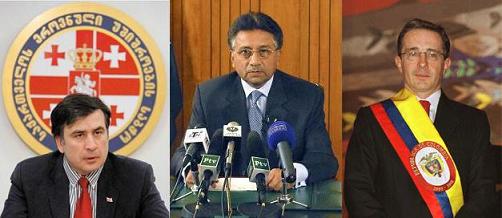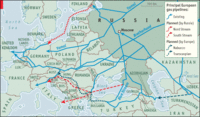
The common thread running through a series of events in the past weeks — from Georgia, to Pakistan, to perhaps parts of Latin America — is one I would term geopolitical stickiness, though unlike the economics term, this is less a natural failure and more one of poor execution and ideological traps getting in the way of strategy.
 In Georgia, US (and to some extent European) strategy has been largely to develop an alternative conduit of oil and gas to Europe that isn’t controlled by Russia, namely, the south stream through the Trans-caspian, BTC, and Nabucco pipelines. As US Deputy Assistant Secretary Matthew Bryza explained to a delegation I was a part of during the NATO summit in Bucharest, US strategic objectives are to ensure competitive energy markets to prevent the chokehold Russia has managed to develop with its control of oil and gas transportation infrastructure.
In Georgia, US (and to some extent European) strategy has been largely to develop an alternative conduit of oil and gas to Europe that isn’t controlled by Russia, namely, the south stream through the Trans-caspian, BTC, and Nabucco pipelines. As US Deputy Assistant Secretary Matthew Bryza explained to a delegation I was a part of during the NATO summit in Bucharest, US strategic objectives are to ensure competitive energy markets to prevent the chokehold Russia has managed to develop with its control of oil and gas transportation infrastructure.
In recent years, Russia has not only used the current energy boom to grow its economy but to punch above its weight geopolitically. Part of this has to do with the US underestimating Russia and Russian interests (I recall two of my colleagues feuding over the proposition of Russia merely being a “Chad with nuclear weapons” — perhaps in the long term with continued uneven economic development and depopulation, but certainly not in the short term). But part of this is Russia’s grip over Europe through its pipelines, which is how it successfully divided France and Germany from the United States over efforts to deploy missile defense systems in Europe.
Balancing their influence and seeking some geopolitical pluralism in the region is a natural part of regional strategy — to develop a regional balance for stability. But the danger — the stickiness — comes when policies begin to get too deeply intertwined with the internal micropolitics such that we lose sight of the broader strategic objective. Attaching our policy too closely to President Mikheil Saakashvili when he was clearly our strongman rather than the noble, crusading democrat we propped him up to be is just such a example. By the time Saakashvili was recklessly trying to convert US support and a promise of entrance into NATO to consolidate internal power, it was clear a Russian (over)reaction was not far behind. And this has likely set back the energy market diversification strategy. We have all along discounted Saakashvili’s risk because we trapped ourselves with sticky, failed democracy promotion efforts in very divided states (like Georgia and Ukraine) without a national consensus or real democratic leaders.
A similar blunder could explain the failures of policy in Pakistan, which arguably required a General President to consolidate power of the civilian government and the military in a state that has always been stricken with weak civil-military relations that leads the army to routinely conducting its own foreign and national security policy. US strategy to stabilize Afghanistan and breakup the safe havens of the Taliban and al Qaeda will only be done through Pakistani help and cooperation, not around them. Which is why backing a dictator who was able to maintain a ceasefire on one of the deadliest potential nuclear flashpoints on the planet — the Indo-Pakistan border — and turn Pakistani military sights on the northern border became a necessary play in the overall strategy.
The stickiness arose as the dictator became more of a source than a cure for the instability in the region — in part because of corruption and authoritarian streaks but also because of pursuing an extremely unpopular campaign in the northwest tribal areas at the US behest, which was politically untenable. This is where US policy, which had been based around cultivating a single personality, rather than a set of institutions, went awry. Apparently it was President Bush who was the last holdout on Musharraf but I suspect that the assurances by Ashfaq Kiyani, the Army Chief of Staff, to Chairman of the Joint Chiefs Adm. Mullen were far more pivotal than Prime Minister Gilani’s in persuading the US to change course. This is because the military remains the most important institutional asset to the US and though we will likely seek to diversify and broaden our support, this will in part remain contingent on civilian leaders, who in the past have failed the test of governance and who’s own records on corruption, competence, and petty feudal politics are checkered at best.
A third regional strategy underway is to prop up Colombia to blunt Venezuala’s growing influence in Latin America and further diversify our oil imports away from Venezuala which provides 12% of US oil imports. The US’s aid — to the tune of $3 billion over the past five years — has been instrumental to Colombia’s ostensible security/stability gains (including protection of oil and pipeline infrastructure) which they are then able to turn around and attract significant foreign investment in the past two years to expand its oil and gas industry. Again, like policies pursued in Georgia and Pakistan, this seems like a worthwhile effort to achieve balance and stability but it contains the beginnings of some serious problems ahead.
Expect the stickiness to come in the form of either over-attachment to President Uribe and his dangerous ties to renegade paramilitary groups, an inflated confidence in Uribe’s military power that expands the conflict the FARC to the borders of Ecuador and Venezuela, or failed US counter-narcotics policy which has continued to obstinately defy empirical realities in Latin America, Afghanistan, and elsewhere. Substantial evidence and studies suggest the US’s lead instrument for counternarcotics — eradication — is counterproductive with little to no track record of success.
Meanwhile, its worth mentioning a gaping missed opportunity to blunt Venezuelan influence and diversify Latin American oil sources. Steve Clemons, Patrick Doherty, Lawrence Wilkerson, and others have all written on the strategic folly of clinging to an antiquated Cuba policy when a change in policy offers a perfect toehold for US strategic ambitions in Latin America. In this case it is our own domestic politics that have proved sticky and inhibited smarter strategies from taking root.
Yesterday, the Financial Times profile on Cuban reforms described how Raul Castro’s small though measurable policy shifts are attracting the interest and investment of China, Brazil, Iran, and Venezuela among others. If our competitors and enemies are on the move in Cuba, it would behoove us to reevaluate our stance there which has a 50 year legacy of failure and may metastasize from simply an opportunity cost to a direct cost at our geopolitical expense.
— Sameer Lalwani


3 comments on “Geopolitical Stickiness — What Our Policies Toward Georgia, Pakistan & Colombia Have in Common”